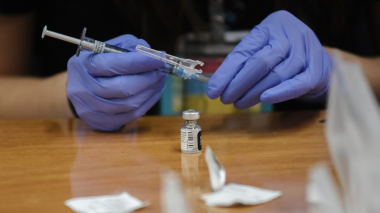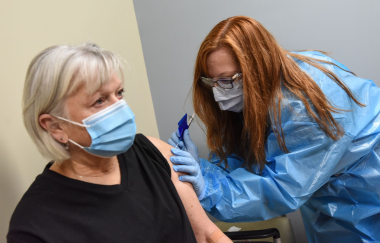Throughout the COVID-19 pandemic, we have shared the latest information and guidance from our trusted infectious disease and infection prevention experts at Atrium Health. Their knowledge and support have helped us navigate some of the most difficult times our communities and healthcare workers have faced.
But there’s more to these experts than the updates and guidelines they provide.
Behind the Credentials
It’s not just the years of clinical training and experience that go into the credentials (although these are certainly important pieces of the puzzle). It’s the passion for the research, the dedication to the communities they serve, and the hope that their knowledge will impact future generations by preventing and treating disease.
 Their reasons for getting into their professions are as unique as the diseases they study. For Katie Passaretti, MD, medical director of infection prevention at Atrium Heath, choosing to study infectious disease and infection prevention was the result of almost leaving the medical field altogether. “I was doing my residency when my mother passed away from cancer,” says Dr. Passaretti. “I had some strong women physician leaders in infectious disease who took me under their wing and introduced me to the field.” Dr. Passaretti loves the logic of infectious disease and the ability to make a difference to patients, employees, and healthcare systems through infection prevention.
Their reasons for getting into their professions are as unique as the diseases they study. For Katie Passaretti, MD, medical director of infection prevention at Atrium Heath, choosing to study infectious disease and infection prevention was the result of almost leaving the medical field altogether. “I was doing my residency when my mother passed away from cancer,” says Dr. Passaretti. “I had some strong women physician leaders in infectious disease who took me under their wing and introduced me to the field.” Dr. Passaretti loves the logic of infectious disease and the ability to make a difference to patients, employees, and healthcare systems through infection prevention.
Anupama Neelakanta, MD, MPH, infectious disease physician and hospital epidemiologist at Atrium Health, grew up in India and says her interest in infectious disease started in medical school as she encountered a variety of fascinating cases involving diseases like typhoid and malaria. “I think prevention and control of infectious diseases, along with diseases that are preventable with vaccines, are one of man’s top public health achievements and touches the community in a large way,” says Dr. Neelakanta.
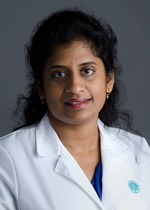
Katherine Poehling, MD, MPH, professor of pediatrics and epidemiology and prevention at Atrium Health Wake Forest Baptist, says her passion to improve the health and well-being of children and families through disease prevention made her want to pursue her career.
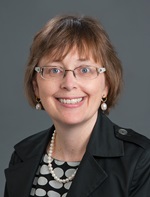
Lewis McCurdy, MD, specialty director of infectious disease at Atrium Health, says his passion comes from trying to meet each patient where they are in their illness and doing what he can to make them better. “I also enjoy the fact that every patient brings a different challenge, and our work often requires some detective skills – solving the infection mystery,” says Dr. McCurdy.
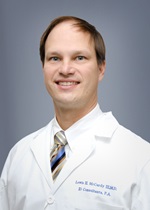
Lifelong Learners
For the amount of time that goes into being an expert, it’s a good thing they enjoy what they do! Dr. Poehling has been working in her field for 26 years. After medical school, she completed her pediatric residency and two fellowships and obtained a master’s degree in public health. Dr. Poehling currently serves on the CDC’s Advisory Committee on Immunization Practices.
Dr. McCurdy has seen a lot in the more than two decades he has been working in infectious disease. This includes two years of clinical fellowship in infectious diseases after residency and two years of basic science and clinical research at the National Institutes of Health (NIH).
On top of her 14 years of education and experience, Dr. Passaretti notes that as a physician, she is required to take continuing education courses as well as certification exams in both internal medicine and infectious disease.
In addition to their formal training, these experts enjoy expanding their knowledge through interacting with patients and peers. Reading journals, attending conferences, and learning from fellow experts in their fields help them to stay abreast in the rapidly changing world of infection prevention and infectious disease.
Everyday People
Their days can consist of seeing patients as infectious disease consultants, looking at trends in COVID-19 hospitalizations and vaccination data, helping to prevent hospital acquired infections, and overseeing seasonal influenza policies to keep patients, employees, and visitors safe.
But aside from their professional responsibilities, these experts have personal routines and responsibilities outside the hospital walls. Dr. Neelakanta drinks coffee first thing each morning to jumpstart her brain. Dr. Passaretti rises by 5 a.m. to get a workout in and reset before her day begins. Every morning, Dr. McCurdy walks his dog. And every night, Dr. Poehling spends time with her grandmother who turns 102 in October.
Hearts for the Future
Although each day brings its own set of challenges, these experts are motivated by the opportunity to improve the health of their patients and make an impact on the future of healthcare.
Dr. Passaretti says one aspect she enjoys most about her work is being able to interpret the data to make it meaningful to others. “This job isn’t easy some days, but I have to believe that some days I make a difference, and someone is alive because of something I did or contributed to.”
A large focus of Dr. Poehling’s work is on improving the well-being of mothers and babies in the community. Much of her time is spent working with local organizations to attract resources and help the most vulnerable. “We are working to adapt the most interesting models from around the nation into local opportunities for innovation,” says Dr. Poehling.
For Dr. Neelakanta, she says her expertise helps her navigate in an age of globalization. “I hope to use my knowledge to be better prepared for future infectious disease outbreaks,” she says. “I think we touch a lot of lives whether it is patients or employees and hope to impact them in a positive way.”
Dr. McCurdy says he hopes that sharing the information he continues to gain will help people understand the importance of prevention and living safely. “Whether that is following safe COVID-19 behaviors, controlling blood sugars in diabetics to avoid infection, or being immunized to protect us from disease.”
While there is a great deal of mistrust of science and data right now, these experts remain steadfast in their commitment to their calling. “Many go into conversations assuming ill intent and ulterior motives,” says Dr. Passaretti. “I truly wish folks understood how seriously I take the responsibilities of my job when I make recommendations and that my goal is always the health and safety of our patients, our fellow healthcare workers, and our community.”


